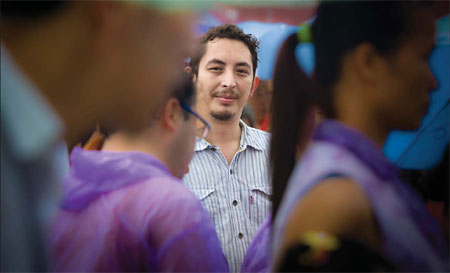You could be forgiven for thinking Can Ozkan was born in Turkey by mistake. Even as he was studying for his degree in travel management at the University of Firat in Elazig, he would make friends among the small Chinese community living in that town and keep talking to them in Mandarin to get a grip on the language.
Later, when the Chinese Embassy in Ankara employed him, the lone Turkish staffer in an all-Chinese office, it gave him scope to fine-tune his Chinese skills. As a restaurant manager and tour guide with the embassy he made his mark.
Soon Ozkan earned his Chinese guide's license from the Ministry of Tourism in Ankara and went through a half-year training period, taking Chinese tourists around Turkey.
In between, he married a local Chinese girl, but the marriage was less than perfect. And then he met Yan Ting, an attractive young Chinese woman tour guide on an assignment to Istanbul, who was still a bit of a greenhorn, looking for directions. Ozkan, with six years of professional experience behind him, was able to hold her hand as she found the way.
|

|
|
Thousands of tourists pass around Can Ozkan at the Forbidden Palace. Ozkan is Chief Representative of the Beijing branch of Flex, a Tourism and Travel agency. [China Daily] |
China was Ozkan's destiny. "I always wanted to work in China," says Ozkan, stating the obvious. His chance came when Istanbul-based Flex Travels decided to set up shop in Beijing in 2007.
"They wanted me because I spoke Mandarin rather well. In fact, I had a fair knowledge of both Chinese and Turkish cultures," says Ozkan - a combination that was hard to beat. Besides, Yan Ting was waiting for him in Beijing.
Flex Travels has gone from strength to strength since Ozkan's arrival. The company that handles travel plans of around a 1,000 Turkish tourists visiting China annually, opened business with Greece, Iran and Israel early this year. The number of outbound tourists from China is substantially larger, around 5,000 a year.
Sitting in their cosy 10th-floor office in Sanyuanqiao, the size of which belies the volume of trade they handle, Ozkan and his colleague, marketing director, Gokhan Sisman, talk animatedly about the custom-made trips they design for their Turkish clients.
For instance, while the Terracotta Warrior is the obvious tourist attraction in Xi'an, visitors from Turkey, mostly Muslims, also like to pack in a visit to the Great Mosque, one of China's oldest, built during the Ming Dynasty (1368-1644).
A particularly demanding client from Turkey recently wanted to find out what he shouldn't be eating while in China, wanting to steer clear of food that might not agree with the Turkish palate. An hour's research on the Internet later, they came up with a long list of "non-edibles". These included preserved egg, snake or turtle soups, durian, bean curd with oyster sauce among others.
Ozkan particularly loves taking the ladies from Turkey through the serpentine alleyways of the hutong around Tian'anmen. "They find out how to prepare Chinese dumplings, which is very different from the way the Turkish variety is made. They are eager to take tips in dressing styles and make-up from Chinese specialists. And the 50-somethings often make it a point to visit Chinese traditional hospitals."
Most Turkish tourists like a bit of self-indulgence when they are traveling. "We take them for a massage by blind masseurs near Huipingli or Liulichang," says Ozkan. This is a traditional form of therapy prevalent in China, based on the idea that the blind have a superior sense of touch than the sighted.
Ozkan believes when in China a tourist must do as the Chinese. "When clients ask for a fork and knife in restaurants I encourage them to try chopsticks instead."
Often, they do not know how to hold them and falter along the way. But, that, insists Ozkan, is where the fun of getting to know an alien culture lies.
Once, during his early days here, while taking a tour group from Turkey around Forbidden City, Ozkan lost his Chinese assistant in the melee. When the clients urged him to tell the story, which Ozkan did not remember too well, he merrily filled in details from tales of the Turkish Palace in Istanbul and the Ottoman Empire to make up for his lack of knowledge of emperor Yong Le's reign in China.
He, of course, is better informed now, but can't stop chuckling about the incident and how he avoided losing face.
At the end of the day, empires located halfway across the world from each other, are not all that different from each other.
(China Daily August 10, 2009)